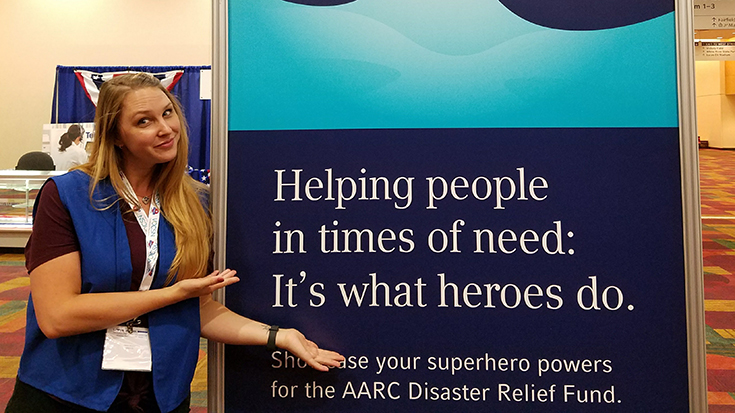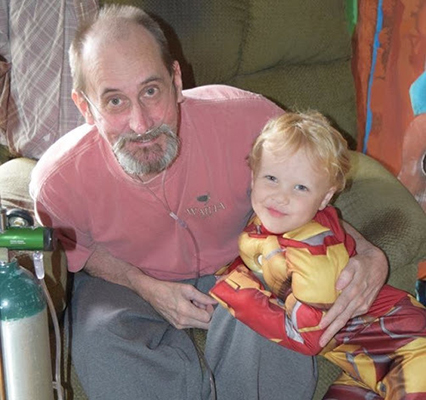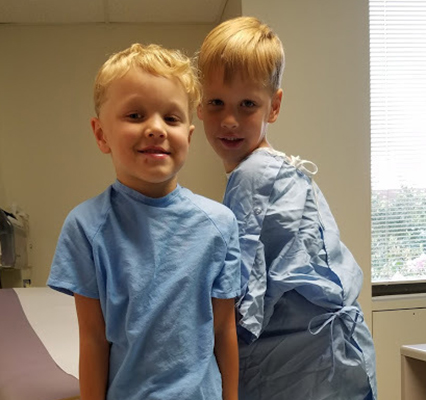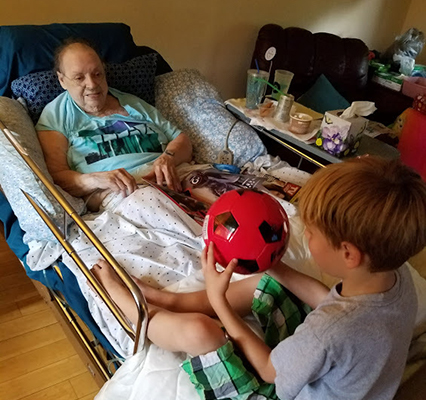
People who are always there for you no matter what just naturally make a big impact on your life.
For Mandy De Vries, RRT, Mark Frazier was one of those people. He eventually became her father-in-law when she married his son Ian, but their relationship dated back to her teens, when he stepped in to fill a father role.
After he was diagnosed with end stage COPD/emphysema and applied for a double lung transplant, testing showed he was Alpha-1 Antitrypsin Deficient, type ZZ. For that reason and others, including a lung resection about five years after his initial diagnosis, the lung transplant was denied and his care escalated as his condition worsened.
That’s when De Vries first learned about the profession of respiratory care.
She found her calling
“He came home one day telling me about these hospital workers called respiratory therapists who were incredible,” De Vries said.

They were at his bedside in the ER, they helped him with his oxygen and nebulizers when he couldn’t breathe, they were the people he saw for testing, and they were the ones who pushed and encouraged him in rehab.
“They just seemed to pop in when things got rough, assessed and fixed the situation and then were gone in a blink of an eye,” De Vries said.
She always knew she wanted to do something in life that would help other people but wasn’t sure what it was. After learning more about the profession and how it was helping her beloved father-in-law, she knew she had found her calling.
“I loved my father-in-law, and knowing I could go to school to help him and people like him was just in my heart,” De Vries said.
It just felt right
About a year and a half after she began researching what a respiratory therapist was, she was admitted into the program at Trident.
“Nothing ever felt so right,” De Vries said.
Mark Frazier lost his battle with Alpha-1 while she was in her second semester, too late for her to play a significant role in his care.
“I had two choices,” she said. “I could feel like I failed him and give up or I could hold my head up high and follow through on the promise I made him.”
She decided to take the latter road, pledging to treat every patient the way she would have treated him and looking at every patient the way she looked at him the day he died, with empathy, understanding, and love.
More family connections
Mark Frazier truly inspired De Vries to become an RT, but he was just the beginning of her familial link to respiratory disease.

Since Alpha-1 is an inherited condition, testing was recommended for her husband and two young sons. Results showed both Ian and her seven-year-old, Eli, are Alpha-1 type MZ, which means they are carriers of the disease.
“Knowing what they have gives us the opportunity to be prepared for anything that may come our way,” De Vries said. “We will be able to track and establish their normals and will then be able to know that if anything starts declining we can be very proactive.”
Added to the mix is her youngest son, five-year-old Liam, who was diagnosed with mild asthma few years ago.
“I really do believe we are each destined for something, and I believe I was destined to be in respiratory,” De Vries said.
No regrets

Shortly after she graduated last May, the family learned her grandmother-in-law, who had also been a big supporter of hers during the past 20 years, was suffering from end stage lung cancer that had spread to her bones as well.
Despite needing to go right to work financially and wanting to put her new RT skills into action, De Vries spent the next several months at her “Nana’s” side as she battled lung cancer in the hospital and then went home on hospice to live out her final days in the comfort of home and family.
“I jumped in and became one of her caregivers,” De Vries said.
In addition to helping with activities of daily living, medications and therapies, De Vries used that time to just be with her Nana, watching the scary movies she loved, listening to her tell jokes, and simply enjoying her company.
She doesn’t regret a moment of it.
“I looked at Nana as such a beautiful piece of living history that would soon be gone,” she said. “It made me hungry to hear her stories and to cherish the way she saw things. I will carry her with me throughout my respiratory journey.”
Beyond excited
De Vries is now working her dream job as an RT at the Medical University of South Carolina’s Children’s Hospital and she’s also going back to school after the first of the year to complete her bachelor’s degree in respiratory care at a new program that’s kicking off at Newberry College.
“I am beyond excited and feel that I want to go back to school for many reasons, with one being that I hope that by pursuing my bachelor’s degree in respiratory it may inspire others too to help propel our profession forward,” De Vries said.
She has been doing her part on that score since she first stepped into a meeting being held by the South Carolina Society for Respiratory Care (SCSRC) board of directors when she was a student.
The camaraderie she found there was amazing.
“I felt out of place for all of five minutes,” De Vries said. “Then the board jumped in and made me feel that my voice mattered too. It was incredible.”
She went on to volunteer at the SCSRC annual conference, where she met people from the national level of the AARC.
“They were so positive and encouraging,” De Vries said. “I soon found myself on the AARC website and became a member immediately.”
Membership is a must
De Vries was selected to attend the AARC House of Delegates meeting in San Antonio and also volunteered her time at the 2016 Congress. She loved the experience and repeated it at the 2017 meeting in Indianapolis in October.
“It was such a fun and great time once again. I was surrounded by like-minded individuals who were all so encouraging and inspiring,” she said.
De Vries believes membership in her professional organizations is a must.
“I will always be a part of my state and national professional organizations for so many reasons,” De Vreis said. “How could you not support these organizations that are there to support your chosen field?”